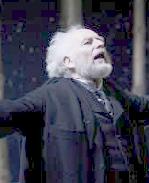SITE GUIDE
SEARCH
REVIEWS
FEATURES
NEWS
Etcetera and
Short Term Listings
LISTINGS
Broadway
Off-Broadway
NYC Restaurants
BOOKS and CDs
OTHER PLACES
Berkshires
London
California
New Jersey
DC
Philadelphia
Elsewhere
QUOTES
TKTS
PLAYWRIGHTS' ALBUMS
LETTERS TO EDITOR
FILM
LINKS
MISCELLANEOUS
Free Updates
Masthead
Writing for Us
A CurtainUp  London Review
London Review
 London Review
London ReviewJohn Gabriel Borkman
|
You traded my love, hawked my love, for the directorship of the bank . . . You disposed of the most precious thing in the world to you FOR THE SAKE OF PROFIT. —
Ella
|

Ian McDiarmid as John Gabriel Borkman
(Photo: Johan Persson) |
The beautifully atmospheric set subtly suggests the imprisonment of the family's predicament. Tall nineteenth-century windows reveal an inhospitable, wintry landscape outside, with continually falling snow. When characters approach, their faces are reflected, as if they are not allowed the privilege of a view and all adding to the sense of captivity.
The house is obviously wealthy and grand, but also dark, gloomy and comfortless. From upstairs, there is the sinister sound of incessant pacing whilst the room itself is sparsely decorated and the few pieces of furniture have panels of bars. When the scene moves outside, any sense of escape is overshadowed by the dangerously hostile Nordic weather. A carpet of pristine snow is rolled out whilst the lighting turns stark and flurries of frozen blizzard falls.
David Eldridge's new translation is clear and naturalistic for so complex a text. In fact, he is able to express Ibsen's detailed emotional nexuses, weighted with past hurts, without sounding pretentious or artificial. Moreover, this script enjoys a cast fully capable of doing the dialogue and the strong characters absolute justice.
Ian McDiarmid puts his stage charisma and presence to excellent use as the fiercely unpenitent John Gabriel. The son of a miner who sees the earth as containing untapped wealth, he has sacrificed himself and others for the sake of profit. However, not avariciously grasping, he is a grandly idealistic, although also hubristic, dreamer. With tunnel-vision egomania, he is infuriatingly majestic in his pride.
The members of his family have all been scarred and deformed by his crime, not least his wife Gunhild. Deborah Findlay's performance simply exudes engrained bitterness. However, rather than alienating the audience, it is obvious that her desperate character has been damaged by suffering. In another impeccable performance, her sister Ella is played by Penelope Wilton. A shell of her former self, she has been hardened by betrayal and abandonment. The fantastic first scene is a steely tussle between the two twin sisters, simmering with resentment and jealousy.
The object of this sisterly rivalry is Gunhild's son Erhart (Rafe Spall). For one sister, he represents all the love she has lost and for the other, he could restore her fortune and honour if he just settled down to dedicating his life to this mission. In reality, he is the spoilt, weak product of being loved obsessively and possessively by two rival mother figures. His answer to the pressure is simply to escape with the scandalously fun and flirtatious Mrs Wilton (Lolita Chakrabarti).
In this very human-oriented tragedy, we see Ibsen's striving for hopefulness in a desolate landscape and wretched situation. With such strong performances, an impressive translation and handsomely designed set, this is a moving drama of towering characters confined by an inescapable, unappeasable past.
|
JOHN GABRIEL BORKMAN
Written by Henrik Ibsen Translated by David Eldridge Directed by Michael Grandage Starring: Ian McDiarmid, Penelope Wilton, Deborah Findlay, Rafe Spall With: Emma Beattie, Lolita Chakrabarti, Lisa Diveney, David Burke Design: Peter McKintosh Lighting: Neil Austin Composer and Sound Design: Adam Cork Running time: 2 hours 20 minutes with an interval Box Office: 0870 060 6624 Booking to 18th April 2007 Reviewed by Charlotte Loveridge based on 20th February 2007 performance at the Donmar Warehouse, 41 Earlham Street, Seven Dials, London WC2H 9LX (Tube: Covent Garden) |




